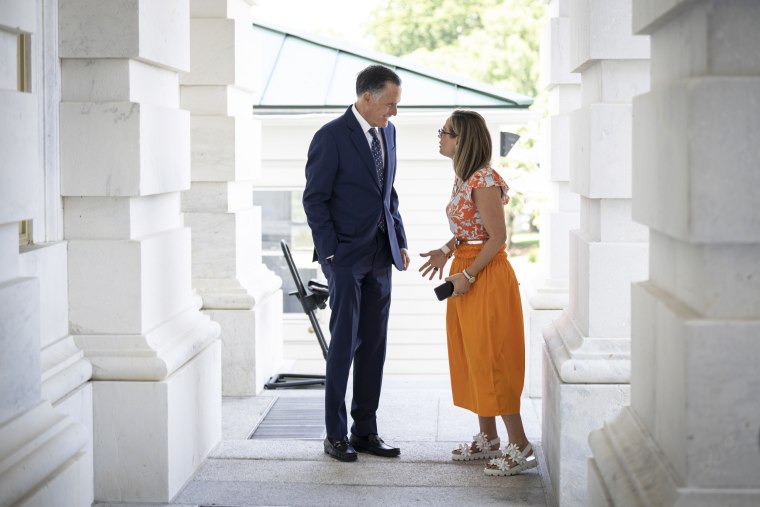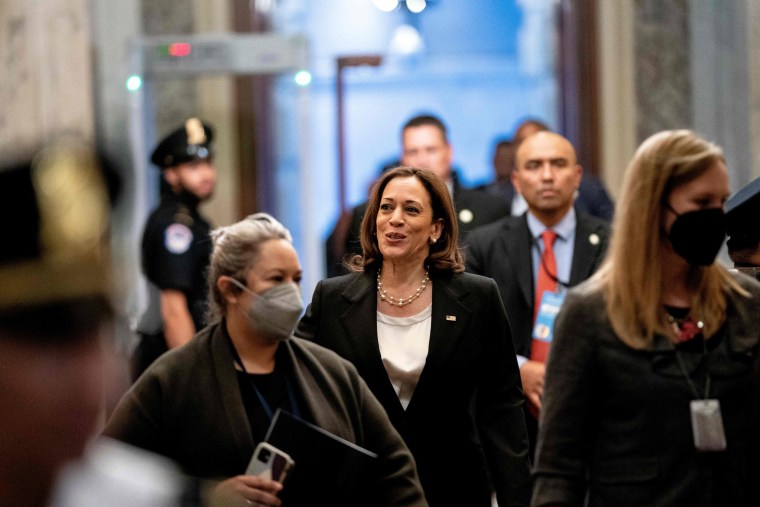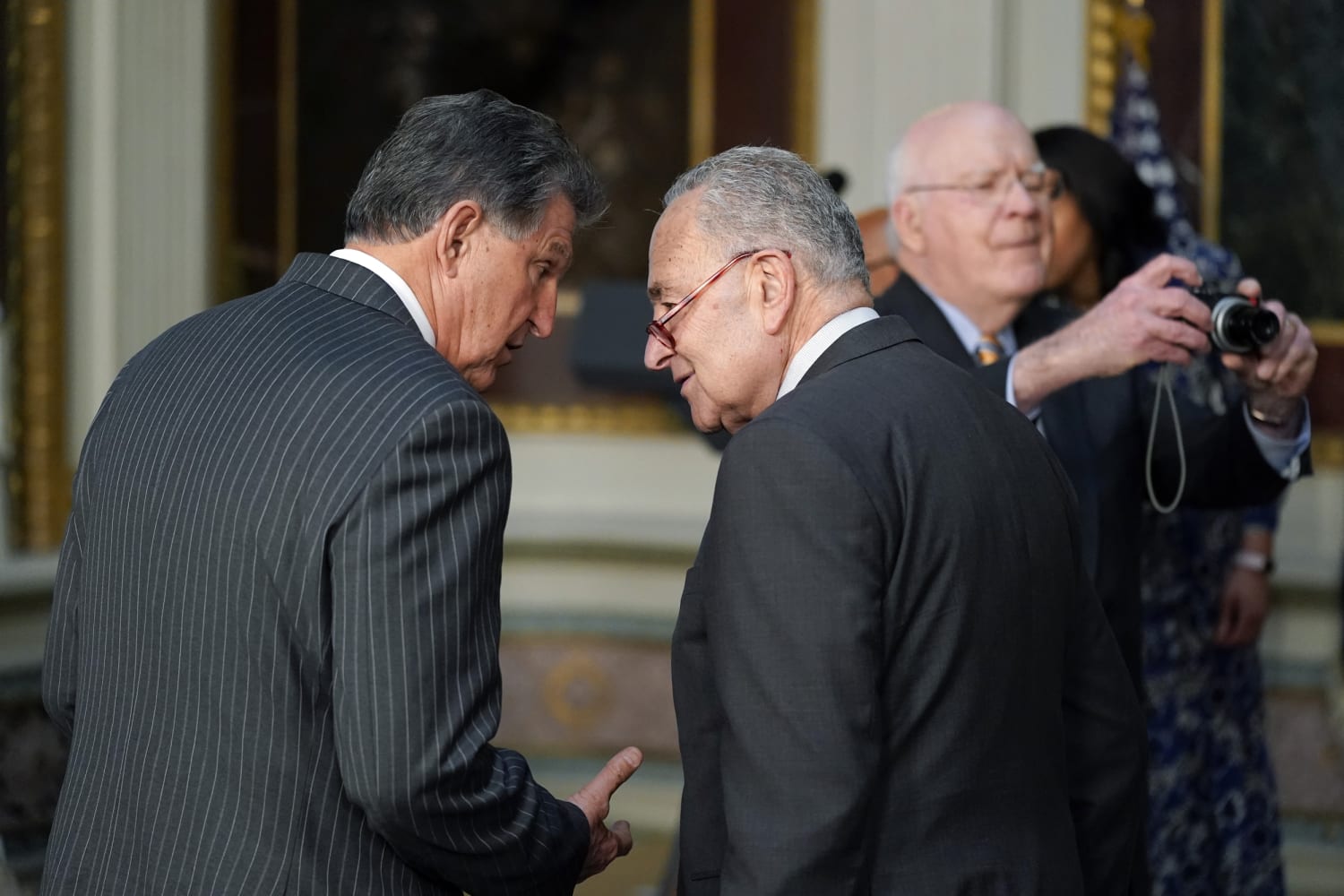Biden’s sign-off
The White House was giving Manchin space too. After Biden’s public breakup with Manchin in December, the White House had instituted a “Fight Club” mentality about any ongoing congressional negotiations — they just refused to talk about talks.
On July 15, as Manchin and Schumer worked to salvage a slimmed-down package, Biden himself seemed to wash his hands of it. “I didn’t negotiate with Joe Manchin. I have no idea,” Biden told NBC’s Peter Alexander in Saudi Arabia when asked if Manchin had been negotiating in good faith.
Behind the scenes, the White House was being kept in the loop. Brian Deese, director of the National Economic Council, kept staff-level conversations going with Manchin’s office. And Ron Klain, White House of Staff, was in regular contact with Schumer.
But unlike in 2021, there were no Biden visits to the Hill to rally Democrats, and there was no White House entourage shuttling between offices, acting as a go-between.
“Because of the way 2021 ended … it probably made it difficult when they were re-engaging to bring in the White House too heavily,” said one Democratic senator, who said he didn’t see any White House presence on the Hill. “It didn’t seem like there was a lot of deep involvement. That doesn’t mean there was not some engagement, but it doesn’t mean there was like a three-way conversation.”
A positive Covid-19 test kept Biden sidelined as talks headed into the home stretch. On July 27, after Biden tested negative and re-emerged from isolation the first time, he was briefed directly by his top advisers on where that final deal stood, and made calls to Manchin and Schumer that night.
“Biden checked in a few times,” said a Democratic source familiar with the talks, “and he deserves credit for trusting the process and knowing how the Senate works.”
Spotlight shifts to Sinema
With Manchin on board, the spotlight turned to the other enigmatic Democrat, Sinema. For a week, she played a game of cat and mouse with the press, refusing to say whether she would back the deal. She also didn’t make it easy for Manchin, who was trying to find time to talk with her about the package.
Manchin found her during a vote series when Sinema was presiding in the Senate president’s chair. He climbed up onto the dais, sporting a mask and gray suit, and spoke with her for about 15 minutes.
For the better part of a year, Sinema had made her red lines very clear with Schumer, Manchin and other colleagues. She had consistently opposed closing the carried interest loophole, which lets private equity managers pay a much lower tax rate on their earnings than most people do on ordinary income. It later came out at her insistence.
“Senator Sinema said she would not vote for the bill, not even move to proceed unless we took it out,” Schumer told reporters last week. “So we had no choice.”
Sinema was incredulous that Democrats’ historic climate bill didn’t include any drought prevention money for drought- and wildfire-prone places like her home state of Arizona. She would have to resolve that issue later with help from Sens. Catherine Cortez Masto of Nevada and Michael Bennet of Colorado, and other Western-state Democrats.
A crucial day
Aug. 4, a Thursday, was a crucial day: Schumer wanted to announce that all 50 of his Democrats were on board ahead of a possible weekend session; Sinema was the lone holdout. But her attention was divided. That afternoon, she was a blur of activity, standing in the well of the Senate floor, whipping Republicans to support the confirmation of Arizona attorney Roopali Desai, her good friend whom Biden had nominated for the powerful 9th U.S. Circuit Court of Appeals.
She’s often regarded as one of Republicans’ favorite Democrats in the upper chamber — she did deals on infrastructure and guns with the GOP this cycle — so it was here that she was going to burn some of her political capital. When she saw Sen. Cynthia Lummis, a staunch conservative Republican, vote no on Desai, Sinema jumped in and asked if Lummis would reconsider her vote.
“This woman is a very dear friend; she is not an ideologue. She will be a very dedicated, smart judge,” Sinema told Lummis, the Wyoming Republican recalled to NBC News. Lummis expressed concern about the liberal 9th Circuit, but Sinema’s personal appeal ultimately won her over.
“Senator Sinema vouched for this woman, so I changed my vote,” Lummis said.
Moments later, Sinema, 46, a triathlete and iron woman competitor, sprinted out the doors of the Capitol yelling: “Has anyone seen Mitt?” She found Sen. Mitt Romney and escorted the Utah Republican back onto the Senate floor, and he too voted yes for Desai. Desai was confirmed 67-29, with 19 Republicans voting yes.

But Republicans would not be happy about what Sinema was doing out of view of reporters and photographers. That afternoon and evening, she was holed up in her tiny, windowless hideaway office, in the bowels of the Senate. A man unknown to most of Washington but well-known to Sinema was shuttling in and out of the room. It was Gerry Petrella, Schumer’s policy director, and they were hammering out the final details of a deal to win her vote.
She trusted him. They had worked closely together on paring back Biden’s original $3.5 trillion Build Back Better package, and he was there when she and Republicans did a deal on a $1 trillion infrastructure bill.
As she and Petrella made good progress, Schumer summoned Sinema to his office to iron out the final details and seal the deal.
About 7 p.m. Sinema arrived. They met for about 30 minutes and sealed the deal with a handshake. The carried interest provision was out, and she would get billions in drought resiliency funding. She wanted $5 billion for the West; Manchin would only agree to $4 billion.
“They don’t have droughts in West Virginia,” quipped one Democratic senator.
To make up revenue loss from the elimination of carried interest, Schumer went with a 1% excise tax on stock buybacks. Sen. John Hickenlooper of Colorado said he had suggested that idea, long on Sinema’s radar, to Sens. Schumer, Bennet and Mark Warner of Virginia during a meeting in Schumer’s office earlier in the week.
The deal was done.
Final passage
After a grueling 15-hour amendment process that stretched from late Saturday night, Aug.6, through Sunday morning and afternoon, the Senate passed the bill, 51-50, with help from Vice President Kamala Harris.

Ultimately, Biden saw the final Senate vote from 120 miles away, having flown that morning during the vote-a-rama to his Delaware beach house.
The House returned from its August recess for one day, Friday, and passed the bill, with all 220 Democrats voting in favor.
“It’s really such a celebration,” a beaming Pelosi told NBC News after she gaveled down the vote to cheers from her members. “The whole bill is so important, but whether it means the kitchen table or the whole planet, it’s a joy to behold.
“Those of us who have been involved in the climate issue for decades are so thrilled beyond words that we have this major, unprecedented commitment in there to saving the planet while the other side is saying there is no climate crisis.”
Schumer’s and Manchin’s staff worked together to release a joint statement at 5:30 p.m., formally announcing the details of the agreement. The leader then spent the rest of the evening briefing Senate Democrats and key House members, as well as numerous environmental groups, to win their support.
Source: | This article originally belongs to Nbcnews.com










